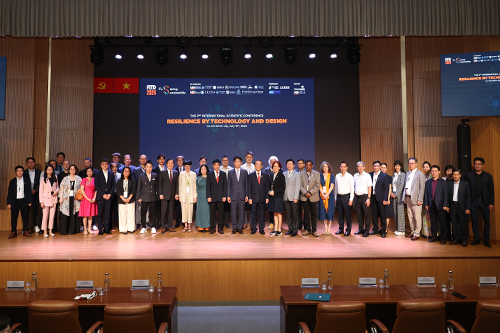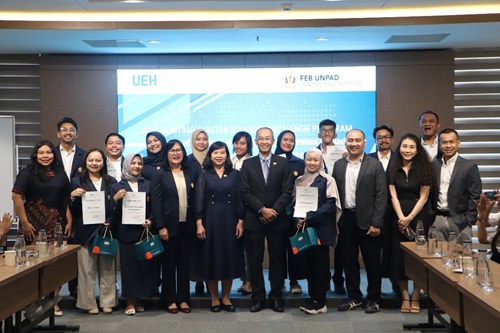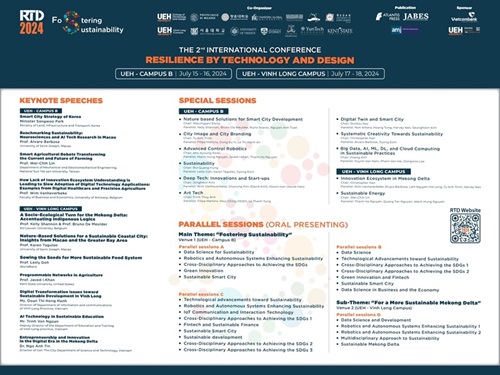![[Podcast] The Relationship Between Emotional Intelligence and Bank Employees’ Commitment to the Organization](https://en.ueh.edu.vn/images/upload/img_background/ueh-bg-103705-052124.png)
[Podcast] The Relationship Between Emotional Intelligence and Bank Employees’ Commitment to the Organization
Keywords: emotional intelligence, job stress, organizational commitment, job satisfaction
Emotional intelligence (EI), one of the intelligence indicators, has a great influence on a person's success in life and work. The author group of Ho Chi Minh City University of Economics (UEH) has applied theories related to EI with the purpose of doing practical research on emotional intelligence capacity and testing the relationship of EI with commitment towards structuring the organization of bank employees in Vinh Long using the PLS-SEM linear structural model. From this foundation, we aim to propose management implications to help leaders improve EI capacity and enhance organizational commitment of bank employees.

Causes affecting the fluctuations in the banking industry in Vinh Long
In the recent years, the personnel situation of the banking industry has had many fluctuations, typically in 2019, the banking sector had more than 4,000 employees that quit or change jobs. These employees move to other occupations or jump to another bank with better remuneration policies and working environments or start their own businesses. Navigos Group’s assessment concludes that the reason for the above personnel change is due to the work pressure that bank employees are under, which can include pressure on sales targets, sales quotas, the expenses on principal and interest collection, inadequate salaries or other issues related to the legality of loans. A working person has to endure a lot of pressures. Without good emotional control, it can affect work performance and even lead to job quitting. At the same time, not controlling emotions well leads to job dissatisfaction in some aspects of work listed as the nature of the job is unacceptable to them or that the salary is not commensurate with their productivity is another reason why employees are not committed to the organization. The banking industry personnel in Vinh Long Province is in the same general situation as above.
Those studies by Gholami, Shams, Amoozadeh (2013); Gopinath et al. (2020); Güleryüz, Güney, Aydin, & Aşan (2008) argue that people’ emotional intelligence can help them regulate and balance their moods in life and work, increasing satisfaction as well as work performance and loyalty also increases. The question is whether banking industry managers are aware of the role of emotional intelligence (EI) in developing employees and increasing their commitment to the organization.
The proposals helping bank leaders improve their employees’ emotional intelligence capabilities
This study was conducted with the purpose of testing the relationship between EI and organizational commitment of bank employees in Vinh Long Province, resulting in proposing management implications to help increase EI capacity and bank employee commitment.
Having the above goal, the author group of University of Economics Ho Chi Minh City (UEH) approached 196 bank employees working at joint stock commercial banks in Vinh Long Province. The assessment results of employees’ emotional intelligence based on the average value of the interval scale indicate that: employees’ ability to self-assess emotions and use emotions is better than the ability to evaluate other people’ emotions (objects of communication) and to control emotions. This is the point that bank administrators need to help employees improve communication efficiency and coordination efficiency at work.
In addition, this study found that surveyed employees admitted to having stress at work listed as working more than 8 hours/day, pressure on sales, anxiety regarding work results and so on. However, these tensions are being within acceptable limits. At the same time, bank employees have commitment to the organization but the agreement level with observations measuring commitment is not high (less than 4.00 points). These issues are the ones that bank administrators need to pay attention to and to find solutions for improvement. Furthermore, based on the “emotional management model” theory by Gross (1998b, 1998a) and the resource conservation theory of Hobfoll (1989) along with the primary data processed with the PLS-SEM model, this study has proven that emotional intelligence has an impact on bank employees’ commitment to the organization, in which the level of indirect influence is stronger than that of the direct influence. This also means that “job stress” and “job satisfaction” play a mediating role in these relationships; However, the mediating role of "job satisfaction" has a stronger influence.
In accordance with the research results, the authors have proposed implications to help bank leaders improve employees’ emotional intelligence capacity through training, team building, and emotional intelligence testing activities or a psychologist can be hired to advise employees. In addition, the study offers management implications to reduce work stress and to improve satisfaction by reviewing human resource policies listed as compensation, job design, and improving working conditions in terms of time and so on and enhancing commitment to the organization, especially the emotional commitment of bank employees to the organization.
The important role of EI in the working environment
The research results of the project, once again, do confirm the important role of EI in the working environment: EI has the ability to reduce the level of stress at work and is proportional to the level of commitment of employees in the banking field. This study also enriches the literature on EI in the banking sector. Other previous studies only focused on analyzing the relationship between EI and organizational commitment, without paying attention to analyzing demographic differences in emotional intelligence and in the relationships between emotional intelligence and and other variables. This study demonstrates that male employees, compared to female employees, are better able to use their own emotions, to evaluate the emotions of others, and to regulate emotions (ROE). This is also a difference from that of the studies of Bhatti et al. (2016), Alsughayir (2021); Kumari et al. (2017) in the banking sector. In practical terms, it can be identified that in the years from 2019 to 2022, the situation of job hopping and quitting a lot in the banking industry is much different, in which a similar case occurred in Vinh Long Province. The investigation presents that the EI competency factor can help employees improve their ability to withstand stress at work, be more satisfied with their work, and increase their commitment to the organization. Therefore, bank managers need to have specific solutions to help employees improve their EI capacity according to the four proposed components to improve stress control effectiveness, to increase satisfaction and commitment towards employee organization so as to reduce the rate of employee turnover.
Please refer to the full article The Relationship Between Emotional Intelligence and Bank Employees’ Commitment to the Organization at here.
Author group: MSc. Võ Thanh Trúc, MSc. Nguyễn Vũ Trâm Anh, MSc. Phan Thị Tiếm, MSc. Nguyễn Đình Thi, Faculty of Administration, UEH - Vĩnh Long.
This is an article in the series of articles spreading research and applied knowledge from UEH with the “Research Contribution For All – Nghiên Cứu Vì Cộng Đồng” message, UEH cordially invites dear readers to look forward to the upcoming Knowledge Newsletter ECONOMY No. #110.
News & photos: Group Author, UEH Department of Marketing & Communication
Voice of: Ngọc Quí




![[Podcast] Latest approaches for sustainable universities](https://en.ueh.edu.vn/images/upload/thumbnail/ueh-thumbnail-042022-071224.png)

